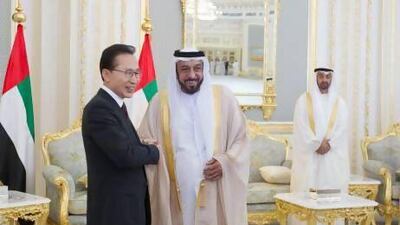ABU DHABI // The UAE’s civilian nuclear energy programme hit a new milestone as the Korean President Lee Myung-bak toured the site of the plant in Barakah yesterday.
The tour marked the completion of almost a quarter of construction work at the site, nearly eight weeks ahead of schedule.
The tour, part of a two-day state visit by Mr Lee, underscored the deepening ties between the UAE and South Korea
Sheikh Mohammed bin Zayed, Crown Prince of Abu Dhabi and Deputy Supreme Commander of the Armed Forces, reaffirmed the deep ties between the two countries.
Sheikh Mohammed praised Mr Lee’s keenness to promote cooperation and support the Emirates’s plans to develop a peaceful nuclear energy programme with the highest standards in safety, security and quality.
The two leaders marked a ceremonial groundbreaking at the site by pouring cement in what will eventually be part of the reactor containment building.
The US$20 billion (Dh73.47bn) project led by the Emirates Nuclear Energy Corporation (Enec) will build four nuclear reactors at Barakah, with the first coming onstream in 2017.
When the fourth reactor is completed in 2020, the facility will be capable of supplying a quarter of Abu Dhabi’s power needs, while greatly reducing the country’s carbon footprint.
The South Korean consortium building the plants, led by Korea Electric Power Corporation (Kepco), was given the green light to start in July after the Federal Authority of Nuclear Regulation granted Enec a construction licence, and approval from the Environment Agency – Abu Dhabi.
The nuclear-energy programme has been held as the gold standard in nuclear development, with an emphasis on safety and transparency and an explicit commitment to forgo uranium enrichment, a process that can be used to fuel reactors but also make weapons.
Abu Dhabi will import its fuel, and has signed agreements with uranium-producing countries including Canada and Australia.
During their visit yesterday, the leaders were briefed on the accomplishments of Enec and Kepco over the past year.
The visit also provided an opportunity to inspect the progress in construction of Units 1 and 2 at Barakah, with 22.75 per cent of construction works completed.
Enec plans to submit applications to beginbuilding units three and four with the nuclear regulator before the end of the year.
Sheikh Mohammed thanked Mr Lee and noted that the impressive progress achieved to date would not have been possible without his foresight and strong commitment.
“The visit is an important milestone for Enec as it reflects the continued strong support to the program from the leadership of both the UAE and the Republic of Korea,” said Muhammad al Hammadi, CEO of ENEC. “We are delighted to be able to report such strong progress on the project, our partner KEPCO has brought world-class expertise to this project, ensuring that we meet our goal of delivering the gold standard of peaceful nuclear energy development,” he said.
Jun Yeon Byun, Executive VP of Kepco, noted that the vision to construct and operate the Barakah plants in adherence to the highest standards of safety and quality was a shared vision between the two nucear operators.
President Lee arrived in the UAE on Tuesday night for the a two day visit. Mr Lee met President Sheikh Khalifa Bin Zayed at Al Rawda palace in Al Ain before setting off for the Barakah plant site in Abu Dhabi’s Western Region.
After the Barkah visit, Mr Lee and the rest of the Korean delegation travelled to the capital for signing ceremonies for two key agreements.
The first agreement, signed by Moon Kyu Suh, President and CEO of the Korean National Oil Corporation and Mr Abdulla Nasser Al Suwaidi. Director General of the Abu Dhabi National Oil Company (Adnoc), will secure 6 million barrels of crude oil for the Korean Strategic International Joint Stockpile Program. The stockpile will reinforce Korea’s energy security while reducing the burden on state budgets, giving South Korea the right to purchase Abu Dhabi crude oil from the Strategic Petroleum Reserve (SPR) in the event of any oil shortage.
The second agreement was signed between the Korea Health Industry Development Institute and the UAE Armed Forces. Major General Mohammed Saeed bin Maran Al Dhaheri, Chief of the Joint Logistics Command penned the agreement on behalf of the UAE Armed Forces and Ms Ko Kyung-hwa signed on behalf of the KHIDI. KHIDI will provide training and expertise to the UAE armed forces on the latest medical developments reached by the institute.
President Lee was hosted at a state banquet Wednesday night attended by key members of the Abu Dhabi royal family, as well as leaders and dignitaries from across the emirate. Mr Lee was expected to depart the UAE this morning.
amustafa@thenational.ae

